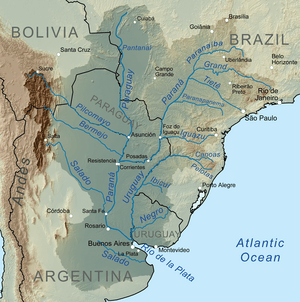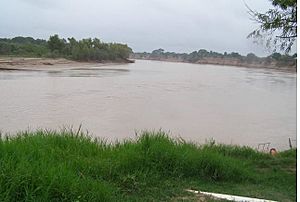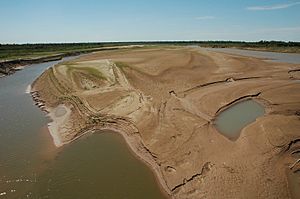Bermejo River facts for kids

The Bermejo River is a very important river in South America. It begins its journey high in the mountains of Bolivia and flows southeast, eventually joining the Paraguay River in Argentina.
This river is about 1,060 kilometres (660 mi) long. Because of its strong currents and changing path, the Bermejo River is generally not used for boats or ships.
Contents
The Bermejo River's Journey
The Bermejo River starts in the Tarija Department of southern Bolivia. It flows through a region known as the Gran Chaco, which is a large, flat area shared by several South American countries. As it travels, the river forms part of the border between Argentina and Bolivia for some distance.
Where the River Flows
After leaving Bolivia, the Bermejo River enters Argentina. It flows through several Argentine provinces, including Salta Province, Chaco Province, and Formosa Province. Along its way, the river picks up a lot of sediment, which is like fine sand and mud. This sediment gives the river a reddish-brown color, which is why its name, "Bermejo," means "vermilion" or "reddish" in Spanish.
Joining the Paraguay River
The Bermejo River eventually meets the Paraguay River near the city of Resistencia in Argentina. The Paraguay River then flows into the Paraná River, and finally, both join the Río de la Plata, which empties into the Atlantic Ocean. So, the Bermejo River is part of a much larger river system that drains a huge part of South America.
Why the Bermejo River is Important
Even though it's not used for travel by boats, the Bermejo River is very important for the areas it flows through.
Water for the Region
The river provides water for many plants and animals in the dry Gran Chaco region. It also helps to shape the landscape, creating wetlands and fertile areas along its banks. Farmers in some parts of the region use water from the river for their crops, especially during dry seasons.
Changing Course and Sediment
One interesting thing about the Bermejo River is that it often changes its course. Over time, the river can shift its path, leaving behind old riverbeds. The large amount of sediment it carries can also cause problems, as it can block smaller waterways and make the river difficult to manage. Scientists and engineers study the river to understand its behavior and how to best use its resources.
See also
 In Spanish: Río Bermejo para niños
In Spanish: Río Bermejo para niños
 | Valerie Thomas |
 | Frederick McKinley Jones |
 | George Edward Alcorn Jr. |
 | Thomas Mensah |



